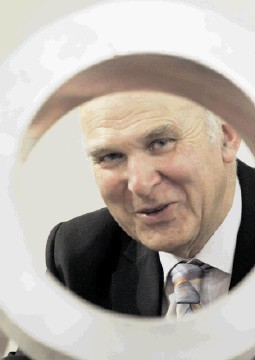
I concluded some time ago that UK Business Secretary Vince Cable was all frills and no knickers but was astonished that he said of the now thankfully dead BAe merger with EADS: “I don’t worry about foreign ownership.”
Cable and his ilk must know that “ownership” provides “control” but they never use the C word because they know it sounds negative whereas of course “ownership” seems fairly benign.
I mean to say, can you ever imagine a government minister saying, for example, that he’s not worried about foreign control of almost the entire UK automotive industry or, in the case of the EADS and BAe fiasco, the UK’s defence sector?
It would be politically suicidal, wouldn’t it? Well, it would in probably any other country but not it seems in the UK where foreign ownership is worn almost like a badge of honour.
But then like many in the Cabinet, Cable has never had a real job, though he did spend a couple of years as chief economist for Shell from 1995 to 1997. However, working for a major oil company for ten minutes doesn’t necessarily qualify you for high office or indeed guarantee success in other industries.
Frankly, I don’t understand BAe.
It should have diversified a long time ago because it’s basically a hi-tech, high-value adding technology and manufacturing company. If it had, then by now it could be a major player in the energy sector and particularly in renewables. Surprising, it’s not especially given its chairman is ex-BP. Or maybe not!
Designing and building technologies such as wind or tidal turbines, subsea controls or other energy-related technologies involves very similar skills and knowledge sets as designing and building submarines, ships and aircraft. So what stops BAe working on these?
Sadly, I believe it can only be a quality of management issue and there are some historic clues as to how entrenched this problem is.
Back in the late 1970s, British Aerospace – the forerunner to BAe – used some of the team that had run the Concorde project to build an all-electric remotely operated vehicle (ROV) called Consub 2.
I know all about Consub 2 because I was around at the time, but as it happens my old friend, technology entrepreneur Richard Marsh was the project manager.
Marsh, of course, became well-known and highly respected for the work he and his colleagues did in building up Tritech International in Aberdeen, which became the most decorated British company in the history of the subsea industry,
Recently though, Tritech fell into American hands and quite understandably Marsh is somewhat upset about that. In fact, we should all be upset by it.
However, the Consub project was ultimately killed off by corporate arrogance and that British disease, short-termism.
The lack of a sensible and intelligent management team with an understanding of the market meant it was grossly overpriced because of their insistence on applying defence industry type overheads.
As Marsh put it; “Formula 1 shows what British engineers can do with enlightened management, but that does not exist in large corporations in the UK, and certainly did not in BAe who just fed off government contracts.”
BAe’s incompetence handed the early ROV market to Amatek Straza an American defence company and it’s interesting that even now US companies like Lockheed Martin are still involved in the subsea sector having recently developed a new Autonomous Underwater Vehicle for both civil and military use (Energy, September 2012).
The question I’d like answered though is why BAe’s management behaves so differently. Is it bad management or is it weak management too easily swayed by the demands of major shareholders or indeed, is it both these things?
Writing in the media the former head of the Work Foundation, Will Hutton, said recently: “Twenty years ago, Britain’s greatest industrial companies were ICI and GEC.
“A third, Rolls-Royce, secured from hostile takeover by a government golden share, had a board that was boringly committed to research and development and to investing in its business. ICI and GEC, under colossal pressure from footloose shareholders to deliver high, short-term profits, tried to wheel and deal their way to success.
“Neither now exists. Rolls Royce, free from concerns about hourly movements in its share price, has gone on to be almost our last remaining great industrial company.”
In July this year, Professor John Kay published the final report of his independent review: “to examine investment in UK equity markets and its impact on the long-term performance and governance of UK quoted companies”.
In broad terms, Kay concludes that the country has far too few Rolls-Royces and came up with a list of companies including Marks and Spencer, Royal Bank of Scotland, BP, GlaxoSmithKline, Lloyds and now BAe that have made strategic errors, or taken other unwise decisions, not necessarily for the benefit of the company or its employees but purely for the benefit of what Hutton describes as “uncommitted tourist shareholders”.
He also claims their overseas competitors who use different ownership structures and incentives, have not just survived but prospered. Given the extent to which UK industry is now controlled by overseas companies this would seem to be a fair assessment.
Cable’s assertion that foreign ownership isn’t scary is scary in itself. It’s a tacit acceptance that bad management and overbearing shareholder influence are acceptable even when it’s bad for the economy and our industrial potential.
But what we in the energy sector need to understand is whether this explains in part at least why this country is so badly represented in the manufacturing of energy technologies. If it is then what can we do about it and how fast can we do it?